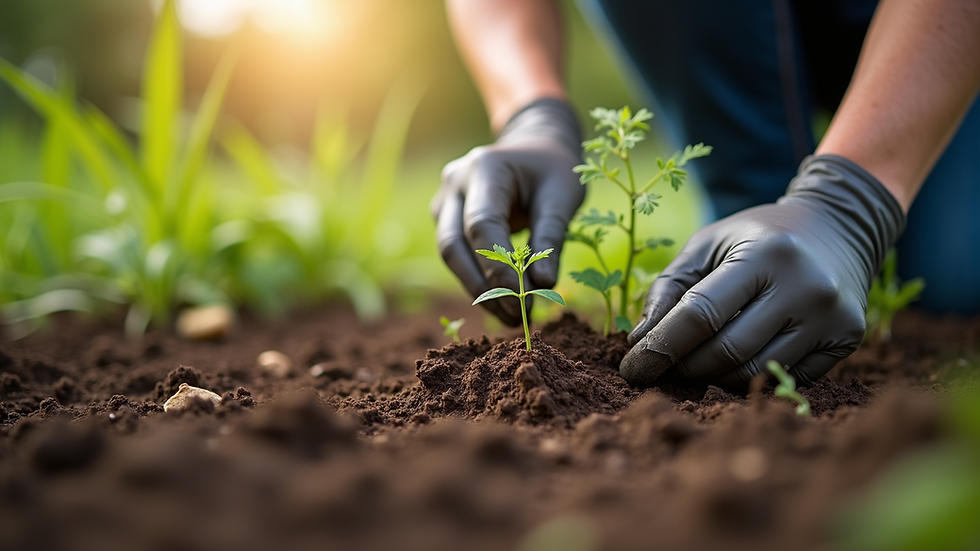Sustainable Farming Tips: How to Grow Organic Produce
- prettyorganicmo
- Aug 5
- 4 min read
In a world increasingly aware of environmental issues, sustainable farming has become more than just a trend. It is a necessity. Growing organic produce not only benefits the environment but also provides healthier food options for you and your family. If you are interested in starting your own organic garden or farm, this guide will provide you with practical tips to help you succeed.
Understanding Organic Farming
Organic farming is a method that focuses on growing food without synthetic fertilizers, pesticides, or genetically modified organisms (GMOs). Instead, it relies on natural processes and materials. This approach not only promotes biodiversity but also enhances soil health.
Organic farming practices can vary widely, but they all share a common goal: to create a sustainable ecosystem that supports both plants and wildlife.
Choosing the Right Location
The first step in growing organic produce is selecting the right location. Here are some factors to consider:
Sunlight: Most vegetables and fruits need at least six hours of sunlight each day. Observe your space to find the sunniest spots.
Soil Quality: Healthy soil is crucial for organic farming. Test your soil to check its pH and nutrient levels. You can improve poor soil by adding organic matter like compost.
Water Access: Ensure you have a reliable water source. Organic farming often requires more water than conventional methods, especially during dry spells.
Preparing the Soil
Soil preparation is vital for a successful organic garden. Here are some steps to follow:
Clear the Area: Remove any weeds, rocks, or debris from your chosen location.
Test the Soil: Use a soil testing kit to determine nutrient levels and pH. This will help you understand what amendments are needed.
Add Organic Matter: Incorporate compost or well-rotted manure into the soil. This will improve soil structure and provide essential nutrients.
Mulch: Apply a layer of organic mulch to retain moisture, suppress weeds, and improve soil health over time.
Selecting Organic Seeds and Plants
Choosing the right seeds and plants is crucial for your organic garden. Here are some tips:
Buy Certified Organic Seeds: Look for seeds labeled as organic. These are grown without synthetic chemicals.
Choose Native Plants: Native plants are adapted to your local climate and soil conditions. They often require less water and are more resistant to pests.
Consider Companion Planting: Some plants grow better together. For example, planting basil near tomatoes can enhance their flavor and deter pests.
Pest Management
Managing pests organically can be challenging but is essential for a healthy garden. Here are some strategies:
Encourage Beneficial Insects: Ladybugs and lacewings are natural predators of harmful pests. Plant flowers like marigolds to attract them.
Use Natural Pesticides: If pests become a problem, consider using natural solutions like neem oil or insecticidal soap.
Crop Rotation: Change the location of your crops each year to prevent pests and diseases from becoming established.
Watering Wisely
Watering is a critical aspect of organic farming. Here are some tips to ensure your plants receive the right amount of water:
Water Early or Late: Watering in the early morning or late afternoon reduces evaporation and allows plants to absorb moisture effectively.
Use Drip Irrigation: This method delivers water directly to the roots, minimizing waste and ensuring plants receive consistent moisture.
Monitor Soil Moisture: Check the soil regularly to determine when to water. Overwatering can be just as harmful as underwatering.
Harvesting Your Produce
Knowing when and how to harvest your organic produce is essential for the best flavor and quality. Here are some tips:
Pick at the Right Time: Harvest fruits and vegetables when they are ripe. This varies by type, so research the best time for each crop.
Use Clean Tools: Always use clean, sharp tools to avoid damaging plants and spreading disease.
Handle with Care: Gently handle your produce to prevent bruising. Store them in a cool, dry place to maintain freshness.
Sustainable Practices for the Future
Sustainable farming is not just about growing food; it is about creating a better future. Here are some practices to consider:
Composting: Create a compost pile to recycle kitchen scraps and yard waste. This enriches your soil and reduces waste.
Crop Diversity: Grow a variety of crops to promote biodiversity. This can help prevent disease and pest outbreaks.
Community Involvement: Join local farming groups or cooperatives. Sharing knowledge and resources can enhance your organic farming experience.

The Joy of Organic Gardening
Growing your own organic produce can be incredibly rewarding. Not only do you get to enjoy fresh, healthy food, but you also contribute to a more sustainable planet.
As you embark on your organic farming journey, remember that patience and persistence are key. It may take time to see the fruits of your labor, but the rewards are well worth the effort.
Final Thoughts
Sustainable farming is a journey that requires dedication and care. By following these tips, you can create a thriving organic garden that benefits both you and the environment.
Embrace the process, learn from your experiences, and enjoy the satisfaction of growing your own food. The world of organic farming is waiting for you, and every seed you plant is a step toward a healthier future.


Commentaires